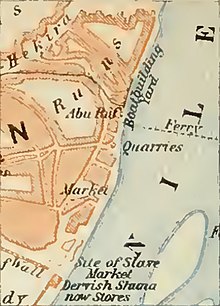Greeks in South Sudan
The population is tiny in number – estimated at 90 – but historically played an important role and has some prominent members, especially First Lady Mary Ayen Mayardit.
However, since Greek contacts with the Nubian kingdoms of Northern Sudan have been established going back more than two and a half millennia,[2] it may well be argued that through Southern Sudanese exchanges with Nubia there were at least indirect relations since ancient times.
[5] When the Turkish-Egyptian forces of the Ottoman Khedive Mohamed Ali conquered the Funj kingdom in 1821, the invading army reportedly included Greek mercenaries of Arvanite origin – who helped pave the.
The most important player in those early years was business-magnate Angelo Capato, who hailed from the Ionian island of Cephalonia and had been supplying the British Army and Navy in the Red Sea port town of Suakin since 1883.
[8] He held British nationality and was particularly close with Governor-General Reginald Wingate:[1] "around 1900, the government granted him, against a promise to supply the expeditionary force with necessary provisions, the monopoly (for two or three years?)
The colonial government supported this immigration as it preferred giving licences to Greek, Jewish, and Syrian merchants, rather than to Northern Sudanese "Jellaba" traders.
In Equatoria, some Greeks – mostly ivory traders, but also a few contractors, engineers and employees – settled in Maridi, Yambio, Tambura, Nzara, Li Yubu, Ezo, Yei, and Mongalla.
[13] The Comboni missionary priest Stefano Santandrea, who served in Wau from 1928 to 1948 and then until 1955 in Deim Zubeir, stressed though that "their competition prevented their [Northern] rivals from exploiting the natives.
"[14] Some Greeks went to set up shops in more remote places of the region, like Aweil, Deim Zubeir, Kossinga, Meshra er Req, Raga, Rumbek, Tonj[1] and Luonyaker.
"[17] The prominent Greek-South Sudanese entrepreneur George Ghines claims that«The first settlers came to Pageri (Eastern Equatoria), just a few miles from the border town of Nimule, a busting trading area.
[..] Hotels, bakeries, café, grocery shops, small industries, cinema and other commercial places, were mostly owned and run by the Greeks who considered Sudan their own new country and Juba their home.»[citation needed]Based on archival research, the anthropologist Brendan Tuttle describes the scenery in Juba as follows:«By the mid-1930s, travelers disembarking at the quay, where the White Nile steamer tied up, would have found themselves on a small wharf not far from the heart of a little colonial town of about twelve-hundred people.
A plot of land was granted to it by the authorities, where the community started to construct building that were rented out in order to create a sustainable revenue source for the association.
[1] Just a few years later they themselves came under pressure, as the Anyanya insurgency escalated across the Southern Sudanese region from 1963 on: after a rebel assault on Wau in early 1964, the military regime of Ibrahim Abboud reportedly "announced that foreign traders would only be allowed to reside in provincial or district capitals in the South, where they could be kept under surveillance, and not in villages.
[22] In fact, an internal Anyanya paper claimed that "Greek merchants of Tembura helped by providing supplies" to a rebel camp in the Central African Republic.
[23] In 1967, two grandsons of Dimitri Yaloris, a Greek formerly based in Gogrial, and his Dinka wife, were killed in Bahr El Ghazal after being accused of supporting the Anyanya rebels.
[14] In Bahr El Ghazal, many Greeks left from smaller towns and moved to the provincial capital Wau with its established community premises.
"[15]However, the Norwegian-Greek historian Alexandros Tsakos concludes that the relationship between the "class" of "pure" Greeks and those of "mixed blood", "who sarcastically call themselves bazramit – 'the half-castes'", has historically not just been "fruitful", but also "difficult".
The building was a warehouse storing wine & spirits, sugar, coal, rubber, trophies and imports from Europe, mainly Great Britain.
"[citation needed]In 2015, "the Divine Liturgy was celebrated for the first time after 38 years in St. Stylianos church in downtown Juba, by Metropolitan Narkissos of Nubia."










